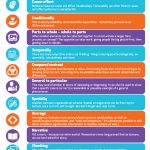Hello friends, I'm so proud to offer a free webinar on unconscious bias in …
Reflective Practice
Infographic: 10 different ways to organize your patient education
Do you ever feel like a broken record, explaining the same topics, the same way, …
[Read more...] about Infographic: 10 different ways to organize your patient education
The more differences between you and your patient, the more important it is to ditch deficit thinking
One medical educator wrote me in response to the podcast, “How a small change in …
“I don’t want to unintentionally offend people”
I was coaching a physician on communication, and at one point our conversation …
[Read more...] about “I don’t want to unintentionally offend people”
12 Reflective practice prompts for health professionals
[This post available as a podcast episode here.] I have heard “reflective …
[Read more...] about 12 Reflective practice prompts for health professionals
Two things to remember before you educate your next patient
Today brings a close to a series I started a few months back, called 5 steps to …
[Read more...] about Two things to remember before you educate your next patient






